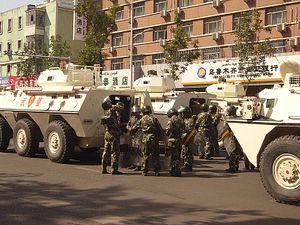Earlier this week, Uyghur foreign fighters with the self-proclaimed Islamic State featured in a propaganda video released by the group threatening attacks in China. In the video, the fighters threaten that Chinese blood will “flow in rivers” and that they will plant their caliphate’s flag in China. (The SITE Intelligence Group has a deeper analysis and translation of the video available here.)
China has long worried that disaffected ethnic Uyghurs — primarily based in the restive western province of Xinjiang, but also across the Chinese border in Central Asia, Afghanistan, and Pakistan — would serve as a powerful vector for the Islamic State to set its sights on Chinese targets.
For decades, Beijing has been worried about separatism in Xinjiang, where militant Uyghur groups have long sought to establish an independent state known as East Turkestan. As a result, the ethnic Han-majority Communist Party of China has enacted a repressive set of laws to strictly regulate religious practices and public life in Xinjiang, imprisoning even non-violent Uyghur voices who’ve spoken out in favor of greater political freedoms.
China has additionally coordinated on counterterrorism with regional states, particularly through the Shanghai Cooperation Organization’s Regional Anti-Terrorist Structure (RATS).
With regard to the Islamic State, however, China has seen little blowback to date. In 2015, one Chinese citizen was taken hostage by the group and killed. The Islamic State has primarily focused its efforts on terrorizing countries that have participated in the international military campaign against it in Iraq and Syria.
China, owing to its principle of non-interventionism in foreign affairs, has not become directly involved in the struggle, but it has supported the government of Bashar al-Assad in Syria, which the Islamic State considers an opponent.
As this week’s video demonstrate, Beijing’s fear that Uyghur foreign fighters would be the primary vector to turn the Islamic States’ sights on China is slowly coming true. Transnational terror groups, including al-Qaeda, have largely ignored China in the past, but the Islamic State’s integration of Uyghurs presents a unique challenge.
The Islamic State’s broader outlook toward global terrorism and China’s recently intensifying repression in Xinjiang all but assure that this week’s propaganda video will be taken seriously by Chinese leaders — even though they may not be surprised. As terrorism expert Max Abrahms had observed in The Diplomat in 2013, China’s growing global footprint made it likely that transnational terror threats would come its way eventually.
Asked about the issue of Uyghur Islamic State fighters at a press conference on March 2, Chinese Foreign Ministry Spokesperson Geng Shuang, while not directly commenting on the video, had the following to say:
I want to emphasize that in recent years the East Turkestan terrorist forces represented by the ETIM [East Turkestan Islamic Movement] are sending fighters to conflict zones and strengthening their collusion with international terrorist forces, posing severe danger to security and stability of relevant countries and the region.
The Islamic State’s ability to coordinate and stage large-scale attacks in China will be limited. Given the CPC’s already-high level of repression and strict control over information flows, including through nationwide web censorship through the so-called Great Firewall, the caliphate’s usual strategy of inspiring lone wolves and affiliate terror groups may prove challenging.
China, however, will no doubt take this threat seriously, adding to its ever-growing list of reasons for repressive practices in Xinjiang. What remains to be seen is if Beijing will begin to take a more active role in the international campaign against the Islamic State, but a propaganda video alone might not move the needle on how far China feels it needs to be involved in that fight.
































